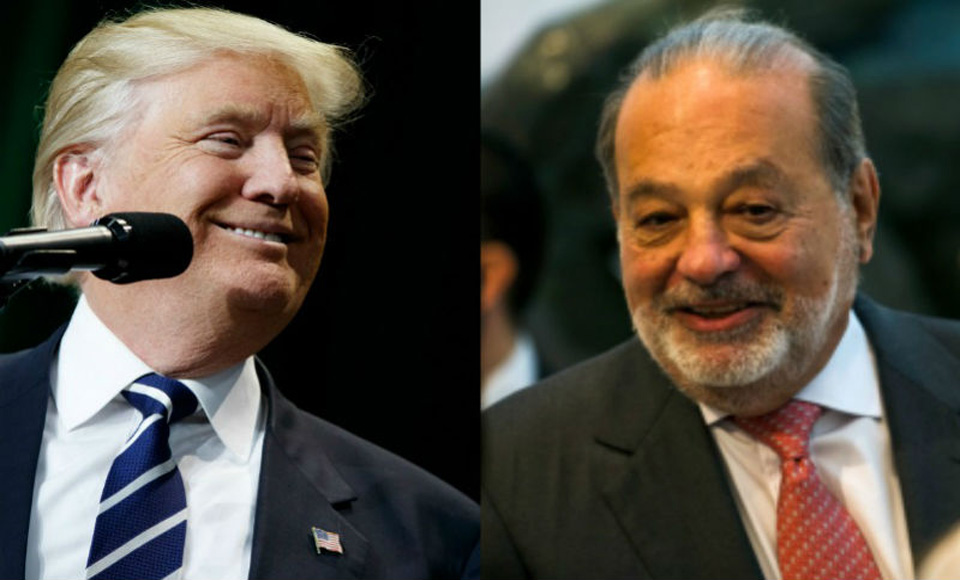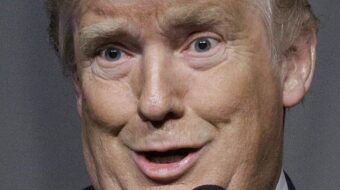
During the whole election campaign, then-candidate Donald Trump railed against NAFTA (North American Free Trade Agreement) and against Mexico and its people. It was part of his strategy of shifting the blame for working class malaise from the ruling class and onto outsiders, foreigners. He said that if elected he would demand renegotiation of NAFTA or would withdraw the United States from it.
NAFTA has had winners and losers since coming into effect in 1994. U.S. agribusiness and other corporate interests are among the big winners. Workers and small farmers in Mexico and the U.S. have been the biggest losers.
But not everybody has been a loser in the NAFTA game. In Mexico, while small farmers were driven off the land by cheap U.S. and Canadian imports, and while workers’ incomes dropped, a small number of wealthy and politically connected business tycoons have profited hugely.
Carlos Slim Helú was one of them. In fact, he probably profited more than anybody in Mexico. Part of the deal for NAFTA involved Mexico privatizing many publicly-owned enterprises. Under the presidency of Carlos Salinas de Gortari, and his successors, state-owned telecommunications services were sold off at fire sale prices. These were snapped up by Slim, who, via his company América Móvil, became the richest man in Mexico and vied with Bill Gates of Microsoft for the position of richest person in the world. Slim’s assets were, at one point, estimated at more than $77 billion. It is estimated that América Móvil’s near monopoly of cell phone operations have cost the Mexican people many billions of dollars.
At one point during our presidential election campaign, Trump had singled out Slim as a particularly nasty Mexican enemy. Trump did not like being criticized in The New York Times, particularly on the subject of his sexual misbehavior, and he found out that Carlos Slim is a major investor in the newspaper. So Trump suggested that, somehow, the Mexican telecommunications tycoon was behind the criticisms on the pages of the Times, as some sort of a Mexican vendetta – similar to the one supposedly being carried out by a Mexican-American judge, Gonzalo Curiel, in the context of the “Trump University” litigation.
It is not recorded whether Trump knows that Slim is of Arab origin (the name was originally “Selim”), as well as being a Mexican citizen. That would have been the icing on the cake. A Mexican and an Arab!
The Mexican government of President Enrique Peña Nieto has recently clipped Mr. Slim’s wings a bit through stricter regulatory mechanisms, and his profits are no longer at the stratospheric level seen before. But he remains the richest man in Mexico and, as they say, “birds of feather flock together.” So it should not come as a surprise that these two ruthless tycoons should eventually meet up and try to find some common ground.
And this they did on Dec. 16, when Carlos Slim called on Trump at the latter’s Mar-a-Lago estate in Palm Beach, Fl. According to media accounts of both, they got along famously. The Washington Post reports that Trump described the encounter as “a lovely dinner with a wonderful man.”
But it is greatly to be doubted that Mr. Carlos Slim Helú just happened to be in Palm Beach that day and on a whim, decided to drop in on Trump. In fact, something more seems to be cooking than just the “lovely dinner.”
The Post article goes on to state that the meeting was, in fact, the product of a complex negotiating process in which Trump was represented by his thuggish former campaign aide, Corey Lewandowski.
In August, Trump suddenly showed up in Mexico City for a joint press conference with Mexican President Enrique Peña Nieto. Peña Nieto was excoriated in the Mexican press for giving the U.S. presidential candidate a stage from which to project his bombast, and as soon as Trump got back to the United States, he resumed his anti-Mexican diatribes.
Neither Hillary Clinton nor Bernie Sanders was invited to a similar event. At the time, there was some inclination in Mexico to attribute the Trump visit to a blunder, perhaps even stupidity on the part of Peña Nieto and his then-Minister of Finance and Public Credit, Luis Videgaray. The latter took the blame for the Trump invitation and the uproar it caused, and then promptly resigned. Mexico’s honor and dignity was said to be compromised by this “blunder.”
But was it really a blunder? Was it perhaps an effort by Mexico’s ruling class or government, or both, to hedge their bets and in the case of the former, protect their material interests in the event of a Trump victory? Was the idea to get Trump to back off his threat to unilaterally raise tariffs on imports from Mexico, or to drop his anti-NAFTA position?
The Slim-Trump dinner and lovefest strongly suggests something of the kind. On Wednesday morning, the Mexico City daily El Universal quoted Juan Pablo Castañón, the head of Mexico’s Business Coordinating Council (Consejo Coordinador Empresarial), as praising the Slim-Trump encounter: “We are celebrating… the most important businessman in Mexico [meeting] with the President-elect is positive because it generates scenarios of agreement and conversation.”
From the point of view of Mexican businesses, outreach to Trump certainly makes sense, as a potential win-win situation. But as they say in Mexico, “Dios los hace, y ellos se juntan” – “God makes them, but they get together [on their own].”
Who, we should ask, will be the losers in a rapprochement between the likes of Slim and Trump?












Comments